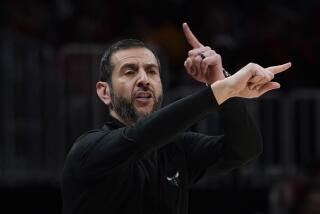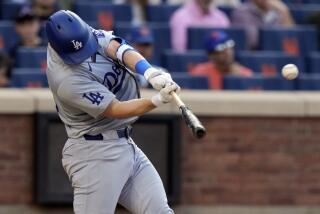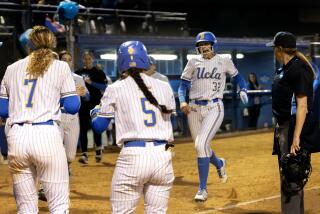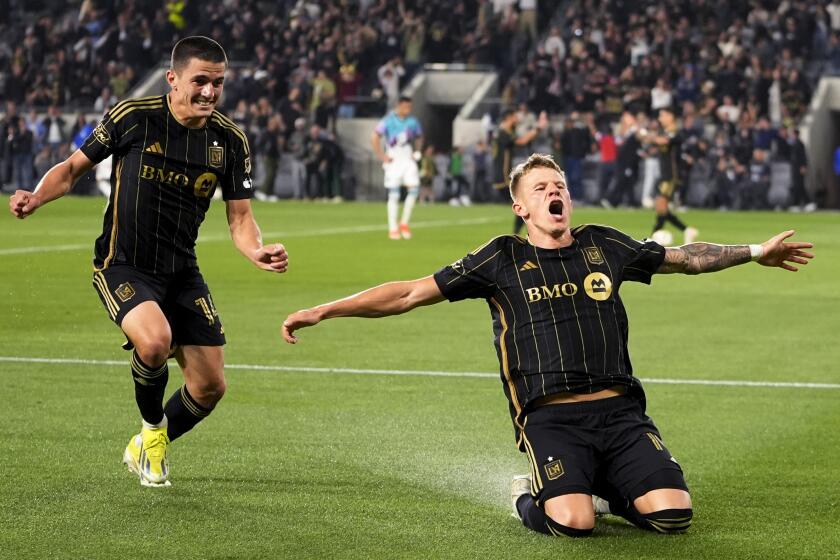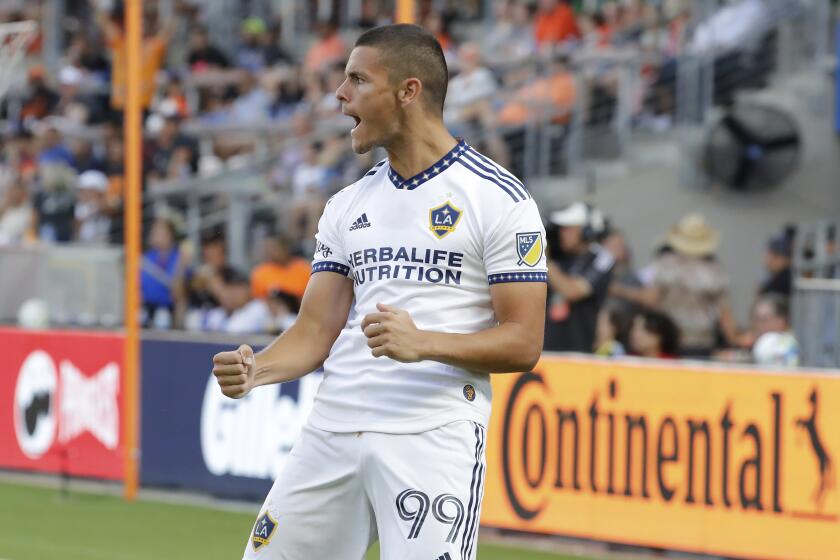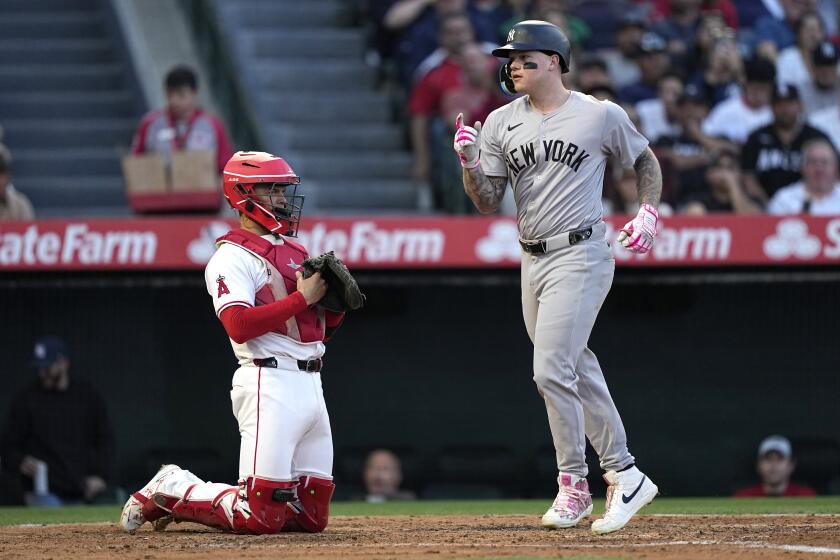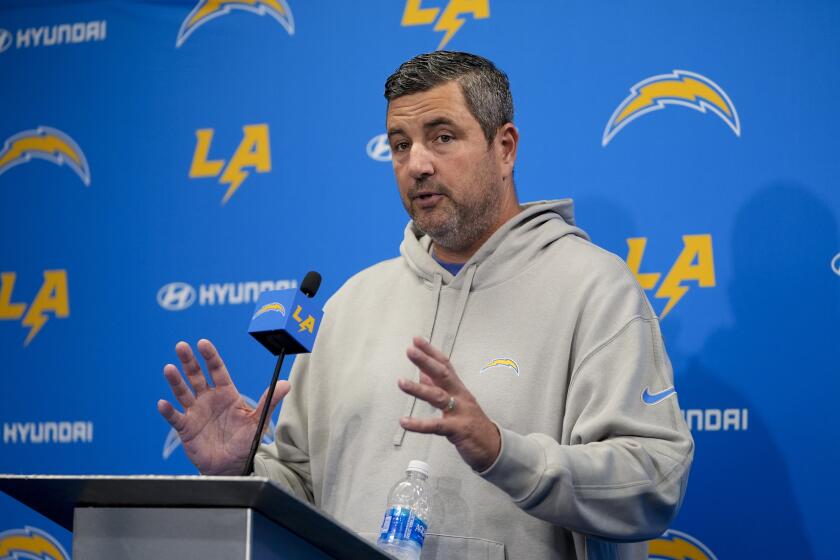The Unsinkable Mr. Brown
Nice knowing you, Motown.
Parting could really have been sweet sorrow this time. It’s not every coach who wins you a title on his way out the door, although Larry Brown has already done it once, with Kansas at the 1988 Final Four amid reports he was headed back to UCLA.
With Brown, the impossible doesn’t take any longer, which is fortunate because, let’s face it, he won’t be around until then.
But this could have been -- and still may be? -- the maraschino cherry atop the sundae of his brilliant, zany career. After putting himself and the Detroit Pistons through a hellish season, with Bill Walton calling him an embarrassment and Commissioner David Stern reportedly Up To Here with him, Brown was going to leave the Pistons with not one, but two NBA titles to remember him by.
He was on track too, four points ahead in the last 1:25 in overtime in Sunday’s Game 5, about to take a 3-2 lead in the NBA Finals....
Of course, in the Finals, everyone’s fate is in Robert Horry’s hands. Now you could keep track of the rest of Brown’s Piston career with an egg timer.
The Pistons won’t soon forget the unsinkable Larry Brown, either. When he arrived, team President Joe Dumars was trying to go with kids and build for the future. Instead, Brown won them a title right away and then, while lining up his next job as Dumars lined up his successor, took them back to the Finals.
The polite fiction, issued daily by Brown and Dumars, is that Brown will go to the Mayo Clinic after the season and, if he’s healthy enough, will continue as Piston coach.
The reality, as Piston officials and people close to Brown acknowledge, is he won’t be back.
Piston fans, known (and feared) for their zeal, are already writing him off. While “American Idol” Carrie Underwood sang the national anthem before Game 4, they cheered when Ben Wallace and Chauncey Billups were shown on the scoreboard TV screens. When Brown went up, there was a subdued moan.
Nate McMillan, who has yet to re-sign with Seattle, and former Minnesota coach Flip Saunders are reportedly on hold, waiting for Brown to leave.
Meanwhile, New York Knick boss Isiah Thomas puts off hiring his next coach, perhaps to see whether Brown will be available.
Brown’s next job will be his 11th (counting the ABA Carolina Cougars, not counting Davidson, where he left before the season started because they wouldn’t carpet his office.) Wherever he goes, a train of devoted assistants follows, like the children of Hamelin following the Pied Piper.
Many have split off, becoming coaches (San Antonio’s Gregg Popovich, Atlanta’s Mike Woodson, Philadelphia’s Mo Cheeks, Kansas’ Bill Self, Missouri’s Quin Snyder, plus former coaches Frank Hamblen, Alvin Gentry, Doug Moe and George Irvine or GMs (San Antonio’s R.C. Buford, Indiana’s Donnie Walsh, Philadelphia’s Billy King, Utah’s Kevin O’Connor, Detroit’s John Hammond.)
Of course, Brown has more than his share of skeptics who think he’s out of his mind.
His admirers, on the other hand, have seen him up close. They know he’s out of his mind.
Join His Staff,
See the World
You think this is bad?
From the spring of 1988, when Brown won the NCAA title at Kansas, to the spring of 1993, he accepted the UCLA job (for the second time, after his first 1979-81 stint), changed his mind, returned to Kansas but left the same summer for San Antonio, was fired (according to Brown) or quit (according to owner Red McCombs), went to the Clippers, took them to the playoffs for the first time since the franchise left Buffalo and left after the following season.
Everywhere he went, teams sprang to life, although the NCAA title required a full-fledged miracle after a 12-8 start, with so many players lost or sent packing, they had to get two football players to come out to have enough players.
“One of them played like 17 minutes in the finals,” says Buford, an assistant on that KU staff. “We had some academic casualties and some that just wouldn’t buy into what we were trying to do....
“But once we got to the tournament, he did his magic. He made these guys believe we could succeed. He just made us believe we could do anything. We’ve all seen him do it in the fourth quarter of games but the second half of that championship game [upsetting favored Oklahoma], it was just one of those deals, he was a hypnotist.”
At the Final Four, Brown was asked about reports he was about to go back to UCLA and issued non-denials. Within days of winning the title, he was at a news conference in Westwood, announcing his return to the Bruins. With him was one of his KU assistants, Gentry, who signed a UCLA contract.
“I told Chancellor [Charles] Young, he better send someone back to Lawrence with Larry,” says Gentry, now a Phoenix assistant. “He said, ‘No, it’ll be all right.’
“We get home and I get a call from R.C. Buford, who says, ‘We’ve got trouble.’ ”
About to attend the Jayhawks’ team banquet, Brown had second thoughts ... and third thoughts ... and fourth thoughts, right up until the moment he spoke.
“When he spoke,” says Buford, “when he addressed the press, I don’t know if he knew what was coming out of his mouth, whether it was ‘I’m staying’ or ‘I’m going.’ And ‘I’m staying’ came out.”
Brown stayed for two more months, anyway, before taking the San Antonio job. The day after that news conference as they drove around looking at homes, Gentry says Brown mused, “I don’t know if I can work for Red.”
Brown brought his KU assistants, Popovich, Buford and Gentry, with him. Everything went as usual for three seasons, but after a disappointing 21-17 start in their fourth in 1991-92, McCombs, a heavy-handed kind of owner, asked Brown, an insecure kind of coach, to meet with him. Brown came out of it saying he’d been fired. McCombs said he hadn’t fired him.
Indisputably, Brown was gone. Two weeks later, he just happened to surface with the Clippers, who were off to the usual slow start (22-25) and had just fired Mike Shuler.
This was the definition of the movable object meeting the resistible force, but for half a season it was a smash. The Clippers went 23-12 and made the playoffs for the first time in Los Angeles.
“It was an absolutely unbelievable coaching job,” says John Hammond, now the Pistons’ GM, then a Shuler assistant whom Brown retained.
“What he did with that team -- there was talent there, obviously -- but how he put that thing together in such a short amount of time.... We started winning immediately. To be honest with you, I was kind of scratching my head, saying, ‘How’s he doing it?’ I really couldn’t figure it out. I was sitting there beside him saying, ‘How is he getting this done?’
” ... My gosh, you’re talking about 12 years ago, it’s the same exact way he’s coaching this team today. Nothing has changed. He still teaches the exact same principles.”
Then, as now, Brown played no-gimmick defense and insisted on moving the ball and playing unselfishly, which he called “the right way.”
Then, as now, it was the right way or the highway.
Then as now, his players were thrilled to be around him.
Then, as now, it wore out and never faster than it did with Danny Manning.
Brown had spent four years at Kansas browbeating Manning into stardom. Worse, Manning’s Clipper contract had only that season and one more left and his agent vowed that Danny would leave. Brown and Manning wound up having it out in Milwaukee in a loud late-night argument in the lobby of the Pfister Hotel.
Nothing is forever or often, in this career, for long. Brown left after his only full Clipper season, although he remains close to owner Donald T. Sterling, who often asks his advice.
If It’s 2003, This
Must Be Detroit
After four years at Indiana (the Pacers, who had never won an NBA playoff series, went to the East Finals twice) and six, improbably enough, with Allen Iverson in Philadelphia (the 76ers, an 18-64 team when Brown arrived, made the NBA Finals), Brown needed a job in the fall of 2003.
Coincidentally, Dumars, who had been ordered to fire his brusque coach, Rick Carlisle, by upper management, needed a coach.
It was a marriage of convenience that promised to become inconvenient. Dumars had just passed up Carmelo Anthony in the draft in favor of 7-foot Darko Milicic, who was younger and further away. Brown’s idea of developing Milicic was to let him ripen on the bench.
Brown wanted Rasheed Wallace, the Portland problem child. Dumars held Brown off, but the price finally dropped to a few bench players and Dumars pulled the trigger.
With the 6-11 Wallace making the small Pistons bigger, they went on a roll and to everyone’s surprise, especially the favored Lakers, won the 2004 NBA title.
Insiders still insisted Brown wouldn’t last long. Not that he cared; when he was asked about it during the 2004 Finals, he said cheerfully, “Oh, I know.”
The 2004-05 season turned into a nightmare. Instead of a summer vacation, Brown coached the Olympic team ... to a third-place finish, while complaining about his players and the selection committee, earning himself special distinction within the league hierarchy, which is particularly sensitive about international competition.
Brown had hip surgery in November and another operation for a bladder infection in March. In between, he called the Knicks’ coaching job “my dream job” after Lenny Wilkens left and expressed his fervent admiration of Kobe Bryant, who reciprocated, after Rudy Tomjanovich left.
Brown’s players bristled. When he stayed away for 17 days in March after his second surgery, there was speculation he was thinking of quitting.
The speculation was true. Brown says it “got real close.”
Nevertheless, he came back. Against all odds, they closed the season on another roll, winning 31 of 41, then advanced to the East Finals ... amid reports Brown was negotiating with Cleveland.
He denied it for days but that was true too. Dumars had given him permission, the Cavaliers had offered him their presidency and he had put them on hold. The long-suffering Piston organization and players bristled anew.
“Sometimes hindsight is something I wish I had,” Brown says. “When Cleveland asked to talk to me and Joe gave me permission, I thought as long as it wasn’t about coaching, what’s the big deal?”
The Pistons got past banged-up Miami, but when they were routed in Games 1 and 2 in San Antonio amid rumblings of anger among the players, the long-awaited implosion didn’t seem far off.
Instead, they regrouped, routed the Spurs in Games 3 and 4 and led Game 5 until you-know-who came along. Brown and the Piston players may not be long for each other but in the meantime, teams don’t come any tougher.
A lesser man might have fled, but Brown insists this season wasn’t his worst.
“Oh, no,” he says. “This has been phenomenal for me.... I mean, there are some issues that I’ve had that I’ve never had to face before, but it seems like every year there’s something. But when I consider what goes on and what other people go through, I’m doing exactly what I want to do.”
As Chuck Daly says of Brown, “He is what he is.” That is: erratic, mercurial, vulnerable -- Pat Riley once said that all coaches feel like Brown, he’s just the one who shows it -- and most of all, likable.
Only one man who ever coached in the NBA could say, “I have a hard time when I don’t think people like me. When I always hear as a coach, ‘Well, I’d rather have the guys respect me than like me,’ that isn’t me.”
That was Brown last week.
It’s not hard to get mad at him. Lots of people in lots of towns think he sold them out. It’s true but then, he may be invited back again, so he can sell them out again.
It’s just hard to stay mad at him. He’s even honest in his way, although it’s not a good idea to take anything he says about a former job (“I had no control over personnel”) or a possible future job too literally.
Coming to a town near you ... if not this time, perhaps the next
*
(BEGIN TEXT OF INFOBOX)
Brown’s trail
Larry Brown’s coaching positions. He won a national championship in 1988 and NBA championship last season. He was ABA coach of the year in 1973, 1975 and 1976, and NBA coach of the year in 2001:
*--* TEAM YEARS TEAM YEARS Carolina* 1972-74 San Antonio 1988-1992 Denver* 1974-76 Clippers 1992-93 Denver 1976-79 Indiana 1993-1997 UCLA** 1979-81 Philadelphia 1997-2003 New Jersey 1982-83 Detroit 2003-05 Kansas** 1983-88 Note: *ABA; ** college ABA record: (win 229-107 (.682) College: (win pct.) 177-61 (.744) pct.) NBA record: (win 987-741 (.571) NBA playoffs: (win 99-88 (.529) pct.) pct.)
*--*
More to Read
Get our high school sports newsletter
Prep Rally is devoted to the SoCal high school sports experience, bringing you scores, stories and a behind-the-scenes look at what makes prep sports so popular.
You may occasionally receive promotional content from the Los Angeles Times.
